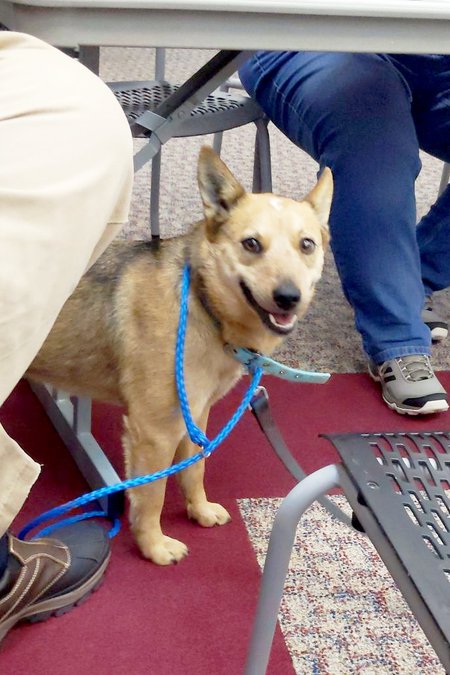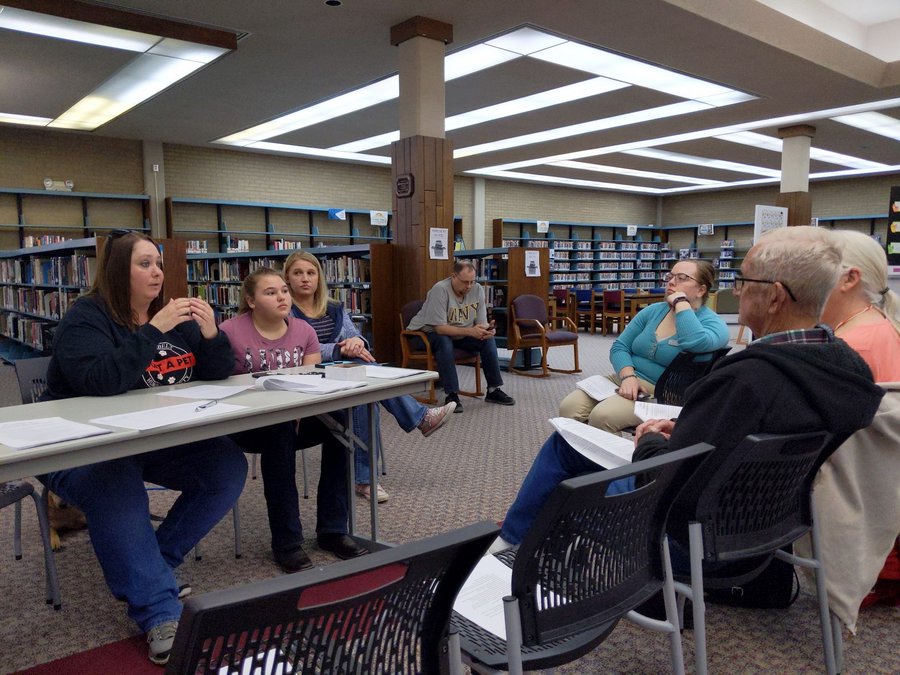Golden Belt Humane Society Director Heather Acheson led a Fostering 101 session at the Great Bend Public Library Saturday morning aimed at encouraging potential foster families for pets. Most animals that find their way to the Golden Belt Humane Society shelter are screened and are available for adoption right away. But others have greater needs which require the services of caring people willing to provide them time to grow or heal. That’s when director Heather Acheson begins making calls to the list of pre-screened foster families in the shelter’s database.
Supplies and support
Bottle-fed babies and severely neglected animals are the ones the shelter needs the most help with, Acheson said.
Some animals need special care, or have greater space requirements than the average dog or cat. The Golden Belt Humane Society has also received horses, various species of wildlife, mothers nearing the end of pregnancy, and occasionally severely abused or neglected animals that need time to rehabilitate in order to become a suitable candidate for adoption.
Acheson takes into consideration the other pets in the foster’s household when determining best placement for a needy pet. Temperament and sociability are also noted. However, sometimes foster pets get stressed in foster homes and may behave differently than in the shelter. In those instances, a different placement is arranged.
Crates, food, litter and litter boxes, bedding, cleaning supplies anything the pet would need is provided by GBHS. Some foster homes purchase additional items they feel comfortable using, but it’s not required. They also provide tools that help to mimic what neonatal animals experience with their mothers.
Home inspections are required, Acheson said. All rescues are listed under the umbrella of the GBHS, and are held to standards of safety and cleanliness to ensure it is a good environment for the animal or animals, she added.
Puppies and kittens
Fosters are encouraged to treat the pet as they would their own, within reason. The GBHS asks they be harnessed and leashed when going into the public, and avoid places like the dog park until it has been confirmed the pet has all required immunizations up to date. Socialization with the public and getting a pet used to riding in the car are all helpful and can help potential adoptees picture life with their new pet.
If a family happens to be fostering when vacation or travel plans are nearing, GBHS will find another foster home for the pet to stay in the interim. This is to ensure it doesn’t pick up or spread things like bordetella, commonly known as kennel cough, to other pets.
Fosters of newborn litters keep a feeding log, and occasionally some will go above and beyond, recording weight too. This can really help potential adopting families feel confident about an animal, Acheson said.
The length of stay varies. Usually, puppies are fostered long enough for the mother to whelp and wean them and for the shelter to make sure they are getting enough food and eliminating normally before advertising availability.
“A lot of times what happens is word of mouth, ‘Hey, we have puppies in foster care,’ and then it just snowballs from there — the puppies are all spoken for and we don’t have to share the word socially,” Acheson said. Reservations are taken.
It’s not uncommon, either, for foster families to get attached to one of their foster pets and follow through with adoption. These are referred to tongue-in-cheek as “failed fosters.”
Foster families share
Members of two foster families shared how extending care to these animals has enriched their lives. Brad and Janet Kuhn have both succeeded and failed as fosters, caring for feral cats, kittens, pregnant dogs and puppies. They were at the library Saturday also. They are currently fostering a litter of Shih Tzu mix puppies born just six days after they agreed to foster the mother.
When this happens, Acheson comes out or makes arrangements with a veterinarian to record weights, schedule vaccinations, and monitor the newborns’ progress.
Sara Ehler, Great Bend, has fostered pets and volunteers for the GBHS. She and her daughter were providing Rosie, a blue heeler corgi mix, with a day out from the shelter on Saturday. They accompanied Acheson and shared their story.
Last December, they fostered a litter of puppies, and two were born with cleft palates. For one, the condition was severe, and it was unable to latch on and soon passed away.
“When something happens to an animal while it is under foster care, we need to be informed,” Acheson said. “Those things happen. Sometimes pets die, and it’s nobody’s fault. As soon as another opportunity comes up, we’ll contact the foster and ask. We just need to be able to document what happened.”
Appointments are made with the veterinarian and the foster family can bring the pet there at no charge, or a representative from the shelter can transport it, whichever arrangements works best.
Ehler adopted the other puppy, whose condition was manageable, and today it is thriving.
Monday, Acheson reported good news. After the program on Saturday, Rosie caught the eye of a couple at the library, and Monday morning their adoption screening was completed and Rosie has found her forever home.
Making a difference
Sometimes tragedy strikes, and pets end up in the shelter and special care is needed. Acheson recounted the story of a pet whose owner died in a traffic accident in Great Bend a few years ago. The dog was with its owner at the time and was injured, requiring special care. Acheson fostered the dog herself. She learned of a friend of the deceased living in Texas. She contacted that person, who agreed to take the dog. After about a month of recovery, she drove the dog back to Texas for a happy reunion. She shared some of her other heartwarming foster stories.
Bottom line, fostering is both challenging and rewarding. It can provide potential pet owners an opportunity to see what it’s like to care for a pet for a limited time, and it can provide time and care needed to give some very deserving pets the best chance to find their forever home.







